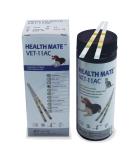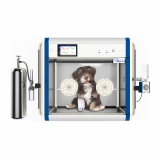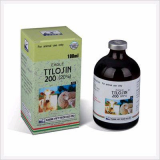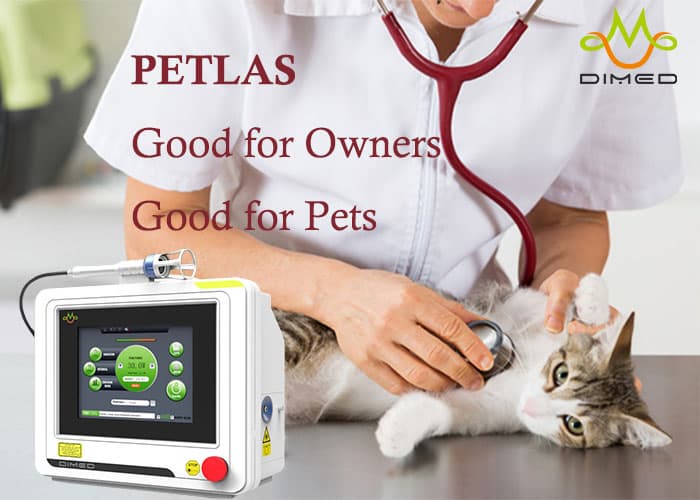Laser Therapy - a great add-on therapy to help speed overall healing: inflammation, pain, or mobility issues
Laser therapy is a pain-free, surgery-free, and drug-free treatment for a wide variety of health concerns. Whether your pet is rehabilitating from injury, healing from surgery, or simply experiencing the signs and symptoms of aging, Laser Therapy is now an option to improve your pet's health and quality of life.
What can Laser Therapy be used to treat?
Laser Therapy can be used from the tip of the nose to the tip of the tail! If your pet has inflammation, pain, or mobility issues, Laser Therapy may be a great add-on therapy to help speed overall healing. Laser Therapy to treat the following conditions:
Arthritis, no matter how chronic or severe
Degenerative Joint Disease and Hip Dysplasia
Skin Infections, Irritations and Allergies
Dental Procedures (tooth extraction pain relief, stomatitis, periodontal disease)
Post-surgery Pain (Spay, Neuter, Tumor Removal, Surgical Incisions)
Ear Infections
Superficial (bites, burns, scrapes) and Deep Wounds (Punctures, Pressue Sores, etc.)
Bruising, Swelling, Strains and Sprains
This list is by no means all-inclusive. Laser Therapy can be used for conditions from the tip of the nose to the tip of the tail…the list goes on and on.
How does Laser Therapy work?
To put it simply, Laser Therapy stimulates the body to heal from within. But what does that really mean? The laser sends photons, which are light energy, into the tissue being treated. The injured cells in the target tissue absorb this light energy and are kicked into "hyperdrive". By absorbing these photons of light energy, cells are stimulated to produce MORE energy which they use to heal and repair themselves. This "photobiomodulation" initiates a biochemical cascade of events that results in:
How it works
a reduction in pain. By increasing nitric oxide production and endorphin release, analgesia (pain relief) is achieved.
a reduction in inflammation. By accelerating cellular activity, injured cells and damaged tissue components are removed from the area,thereby reducing swelling and allowing for more rapid repair and regeneration.
accelerated tissue repair and cell growth. Photons of light penetrate deeply into tissue and accelerate cellular reproduction and growth. Laser light increases the energy available to the cells so they can take on nutrients and get rid of waste products more quickly.
Is my dog a candidate for Laser Therapy?
What can my cat expect during a Laser Therapy treatment session?
How often will he need Laser Therapy?
In order to determine if Laser Therapy is a treatment option for your pet, we will recommend a physical exam to evaluate your pet's health concerns. During this exam, we can determine what the best course of treatment will be for your pet. If Laser Therapy is indicated, our veterinarian will review the treatment plan with you which will include which areas may benefit from Laser Therapy as well as how often Laser Therapy is recommended. Because each pet's health and needs are unique, our veterinarians will design a treatment plan best suited for your pet.
For most pets, Laser Therapy treatment is relaxing and generally very well tolerated. We use soft bedding and minimal restraint so that your pet can remain as comfortable as possible during the treatment. If space allows and it provides comfort to your pet, you may be able to be present for the Laser Therapy treatment. Protective eyewear is provided for both you and your pet!
As the Laser Therapy session begins, the movement of the laser treatment head and the warmth of the laser is usually soothing to your pet. Most treatement sessions take only a matter of minutes. Quite simply, Laser Therapy provides relief. This relief of pain will allow your pet to be comfortable and any anxiety initially experienced at the start of treatment typically lessens as the treatment progresses.
How would I know if my pet might benefit from Laser Therapy?
Many of our Laser Therapy patients are older cats and dogs with musculoskeletal ailments. If your pet exhibits any of these signs, it is possible they are experiencing pain or discomfort and may benefit from laser therapy:
abnormal sitting or lying down postureLaser Therapy for Elderly Animals
circling multiple times before lying down
restlessness
whining, groaning or other vocalizations
limping, unable to get up or lie down, difficulty using stairs
lack of grooming
won't wag tail
behavioral changes – avoiding contact, isolating self from others
inappropriate urination/defecation – not able to get in/get to the litterbox
inability or difficulty jumping to spots that were easy to get to in the past
lack of appetite
Is this the same kind of Laser Therapy that humans use? Who else is using Laser Therapy?
Since receiving clearance from the Food and Drug Administration in 2003, Class IV Laser Therapy has become an increasingly important therapy in the treatment of musculoskeletal injuries in humans. Because Laser Therapy reduces pain, reduces inflammation and speeds healing, many professional organizations have incorporated it into their treatment plans. Not only is Laser Therapy being used by over 2000 veterinary hospitals, but it is also being used by physical therapists, orthopedic practices, and many professional sports. Our own Philadelphia Phillies and 76ers utilize Laser Therapy! And don't forget the athletes of the Olympic games…they use Laser Therapy as well! If the pros are using it and are seeing great results in injury rehabilitation and pain management, then why not give your pet that same opportunity?









_2.png)



































 China
China



